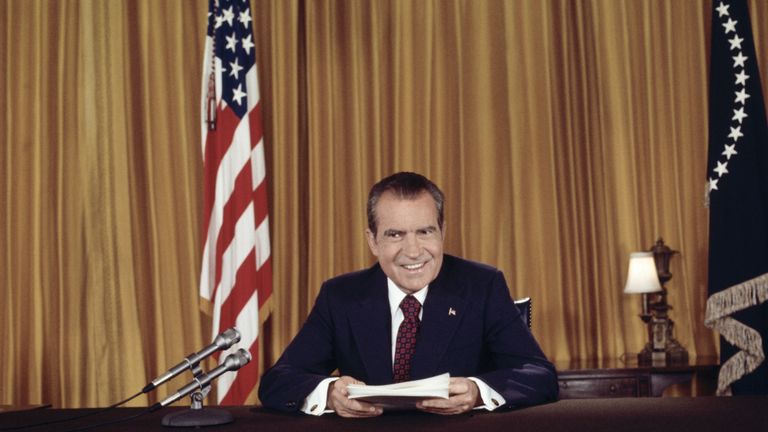Can Trump pardon himself? President is said to have asked aides about consequences
Thursday 14 January 2021 15:19, UK
Donald Trump has pardoned several of his closest confidantes over the past month, and has previously asserted he has the "absolute right" to do the same for himself.
The 45th president is said to have discussed pardoning himself and his family, asking his aides what effect it would have on him legally and politically, two White House sources told the New York Times.
Sky News examines whether Mr Trump can pardon himself and his family members ahead of Joe Biden's inauguration on 20 January.
Professor Michael Gerhardt, a law professor at the University of North Carolina, who testified as a constitutional expert at Mr Trump's 2019 impeachment proceedings, has provided some expert analysis.
How do presidential pardons work?
A president can pardon an individual at any point, including before a person is charged with a crime.
This means they can be protected from prosecution as a pardon gives them legal immunity from criminal liability.
However, a court would have to rule whether to accept if that pardon is valid.
For those who have already been found guilty of committing a crime a presidential pardon means they are off the hook.
However, a president can only pardon federal crimes so anyone pardoned can still be prosecuted by any of the 50 states.
Can a president pardon himself?
The constitution is not 100% clear on this, and it is not something another president has attempted before.
Prof Gerhardt said: "There is a division of opinion on whether a president can pardon himself, but slightly more think he cannot.
"I do not think the president does have the power to pardon himself.
"First, if you look at the constitutional language, the president isn't given the power to pardon, he's given the power to grant a pardon.
Subscribe to the Daily podcast on , , ,
"To grant, when the constitution was written, and now, means to give someone else the power to be pardoned - that doesn't mean to grant himself something.
"I take that as the president can't grant himself anything.
"Secondly, if we just look at the overall purpose of the constitution and its structure, the framers rebelled against a king and it makes no sense whatsoever to look at it and say they would want that, there's no indication that they intended to create a king or give the president the power to raise himself above the law.
"The people placed him in power, there are mechanisms in the constitution to address his behaviour in office.
"But, there's nothing that suggests he's the one person in the States that can raise himself above the people."
But, will Mr Trump try to pardon himself?
"I'm sure he will try and he may well do it," Prof Gerhardt said.
"I've heard that people in the White House are urging him to not do it, but he likes to do things people tell him not to."
Would that be an admission of guilt?
"Yes, I think so," said Prof Gerhardt.
"If someone is given a pardon, in accepting that pardon the person implicitly acknowledges their guilt.
"If he proceeds to pardon his family, they're acknowledging their guilt."
Can Mr Trump pardon his family?
Yes. Just as he has pardoned some of his aides and associates, Mr Trump can pardon his family. Several, including his daughter Ivanka and her husband Jared Kushner, and his son Eric Trump, have worked very closely with him during his term.
Prof Gerhardt added: "He will say that it is to protect them from Biden and the Democrats.
"In fact, it is because they have been self-dealing and breaking laws left and right, which he does not want them to be held accountable for."
Can Joe Biden pardon Mr Trump when he becomes president?
Yes, he can. Gerald Ford, when he became president, pardoned Richard Nixon for any crimes he might have committed as president, in particular covering his actions during the Watergate scandal.
Mr Ford said he felt it was in the best interests of the country and the Nixon family's situation was "a tragedy in which we all have played a part. It could go on and on and on".
But, Prof Gerhardt thinks it is unlikely Mr Biden would do the same for Mr Trump.
"That's going to be a political choice, it's not unthinkable for Biden to give Trump a pardon to put the whole mess behind us.
"But, I think he's unlikely to, I think he's likely to take the position that 'Trump's not my responsibility so, however the chips fall for Trump is really his doing and I'm not a party to that'."
What happens if Mr Trump does pardon himself?
Prof Gerhardt said: "If the president does pardon himself then that may end up before the Supreme Court as it's likely that a federal prosecutor will go after Trump for some illegality during his time in office."
Would pardoning himself get Mr Trump out of being impeached?
No. The constitution is very clear, it says: "He [the president] shall have power to grant reprieves and pardons for offences against the United States, except in cases of impeachment."
Prof Gerhardt added that there is no question what he did to incite violence at the Capitol is an impeachable offence.
"Every scholar that has integrity would agree this is impeachable so we don't even get into the business of whether this is impeachable," he said.
"This is like driving 100mph in a school zone when you can only drive 25mph - it's so obvious."
He added that it does not matter that he will have left office by the time the proceedings start, "as there is precedent".
And he said the reason for the Democrats impeaching him is "to put on the record yet another mark for Trump, for all of history".









